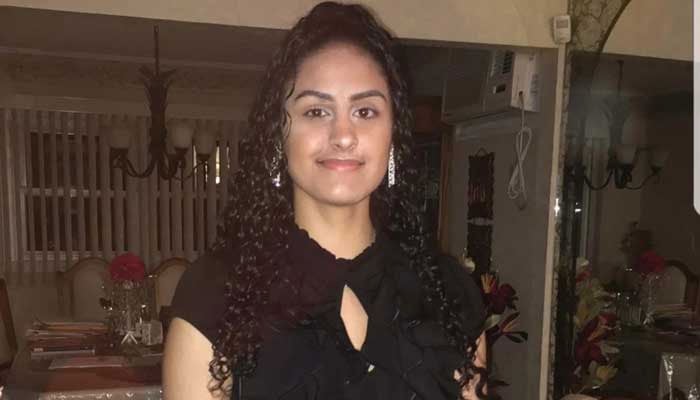New York acid-attack victim: Pakistan assures ’every possible assistance’ to family
ISLAMABAD: Pakistan on Saturday assured “every possible assistance" to the family of Nafiah Ikram, an American citizen of Pakistani descent, who was left disfigured in an acid attack outside her New York home that also left her nearly blind.
“The Consul General of Pakistan in New York is in contact with the family and has offered every possible help,” Spokesperson of the Foreign Ministry Zahid Hafeez Chaudhri said in a statement.
Nafiah is an American citizen of Pakistani descent and is residing along with her parents in Long Island.
The spokesperson said the local police department had deputed a 12-member team to investigate the incident.
“We should wait for investigations to complete to ascertain the nature of the crime and the motive behind it,” Chaudhri said.
However, he said the Pakistan Embassy in Washington DC and Consulate General in New York would closely follow developments and would provide "every possible assistance" to the family.
Nafiah Ikram, 21, and her mother were getting out of their car outside their home on March 17 when an unknown man rushed up to her, threw a caustic liquid at her face and ran off. She was left severely burned and nearly blind.
Activists have demanded that the crime be investigated as an anti-Muslim hate crime.
Nafiah, who is studying medicine at Hofstra University, and has plans to be a doctor, was rushed to the hospital by her mother, who also works there.
Her father, Sheikh Ikram, 50, said that Nafiah was targeted on her way home from work.
Meanwhile, Police Commissioner Patrick Ryder asked anyone with information to come forward and call, announcing a $10,000 reward for information leading to an arrest.
“This attack was a vicious and heinous crime and I am personally requesting anyone with knowledge to come forward,” he said.
The attack left her hospitalised for 15 days, with severe burns to her face, eyes, neck, and hands, according to the New York chapter of the Council on American-Islamic Relations (CAIR), a Muslim civil rights group.
-
 Heavy Snowfall Disrupts Operations At Germany's Largest Airport
Heavy Snowfall Disrupts Operations At Germany's Largest Airport -
 Andrew Mountbatten Windsor Released Hours After Police Arrest
Andrew Mountbatten Windsor Released Hours After Police Arrest -
 Heidi Klum Eyes Spooky Season Anthem With Diplo After Being Dubbed 'Queen Of Halloween'
Heidi Klum Eyes Spooky Season Anthem With Diplo After Being Dubbed 'Queen Of Halloween' -
 King Charles Is In ‘unchartered Waters’ As Andrew Takes Family Down
King Charles Is In ‘unchartered Waters’ As Andrew Takes Family Down -
 Why Prince Harry, Meghan 'immensely' Feel 'relieved' Amid Andrew's Arrest?
Why Prince Harry, Meghan 'immensely' Feel 'relieved' Amid Andrew's Arrest? -
 Jennifer Aniston’s Boyfriend Jim Curtis Hints At Tensions At Home, Reveals Rules To Survive Fights
Jennifer Aniston’s Boyfriend Jim Curtis Hints At Tensions At Home, Reveals Rules To Survive Fights -
 Shamed Andrew ‘dismissive’ Act Towards Royal Butler Exposed
Shamed Andrew ‘dismissive’ Act Towards Royal Butler Exposed -
 Hailey Bieber Shares How She Protects Her Mental Health While Facing Endless Criticism
Hailey Bieber Shares How She Protects Her Mental Health While Facing Endless Criticism -
 Queen Elizabeth II Saw ‘qualities Of Future Queen’ In Kate Middleton
Queen Elizabeth II Saw ‘qualities Of Future Queen’ In Kate Middleton -
 Amanda Seyfried Shares Hilarious Reaction To Discovering Second Job On 'Housemaid': 'Didn’t Sign Up For That'
Amanda Seyfried Shares Hilarious Reaction To Discovering Second Job On 'Housemaid': 'Didn’t Sign Up For That' -
 Hilary Duff Reveals Deep Fear About Matthew Koma Marriage
Hilary Duff Reveals Deep Fear About Matthew Koma Marriage -
 Will Sarah Ferguson End Up In Police Questioning After Andrew’s Arrest? Barrister Answers
Will Sarah Ferguson End Up In Police Questioning After Andrew’s Arrest? Barrister Answers -
 Matthew McConaughey Gets Candid About AI Threat To Actors: 'Be Prepared'
Matthew McConaughey Gets Candid About AI Threat To Actors: 'Be Prepared' -
 Hailey Bieber Shares How 16-month-old Son Jack Blues Is Already Following In Justin Bieber's Footsteps
Hailey Bieber Shares How 16-month-old Son Jack Blues Is Already Following In Justin Bieber's Footsteps -
 Zuckerberg Denies At LA Trial That 'Instagram Targets Kids' Amid Addiction Claims
Zuckerberg Denies At LA Trial That 'Instagram Targets Kids' Amid Addiction Claims -
 France Sees Record 102mn International Tourists In 2025
France Sees Record 102mn International Tourists In 2025




